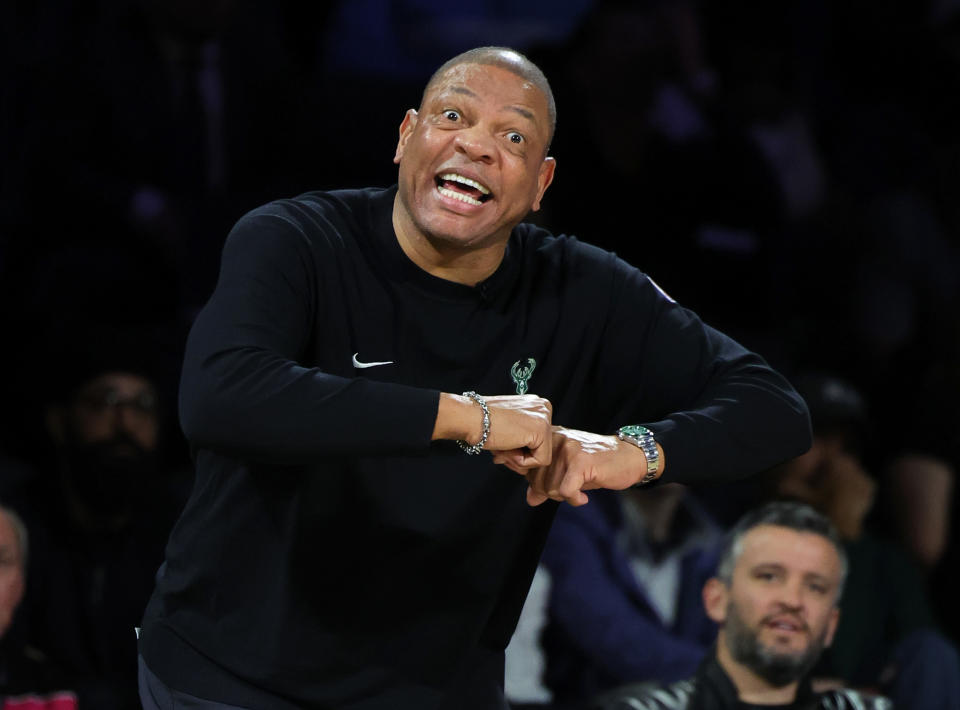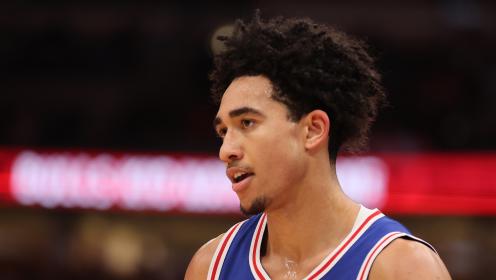LAS VEGAS — Doc Rivers stopped himself from going into a full rant — half baptist preacher, half exasperated coach — when talking about the simplicity of basketball, the simplicity of this NBA Cup.
“I’m not gonna get on the soapbox,” Rivers said Saturday. “But I just think, and they’re gonna [blame this] generation, but I’m trying not to, but accept the challenge. We run from challenges a lot.”
The Milwaukee Bucks coach wasn’t talking about his team specifically with “We,” but regarding basketball culture as a whole. In a lot of ways, players have become too cool to try, that something as physically and emotionally draining as putting yourself out there is looked upon as a black mark, a reason to ridicule players. Being a “try hard” is mocked in some spaces, in maybe small but loud corners of basketball discussion.
That’s why the Milwaukee Bucks advanced past the Atlanta Hawks to the NBA Cup final, which will take place Tuesday night in Las Vegas, and even perhaps why Warriors coach Steve Kerr was so dismayed at the ridiculous call at the end of his team’s knockout round loss to the Houston Rockets on Wednesday.
Both coaches were unafraid to put it out there, even though this isn’t a playoff series or playoff game, and this can easily be forgotten by the All-Star break when the regular season truly sets into its usual lather, but it’s high-stakes competition that should be invested in.


“Let’s put our name out there,” Rivers said. “We’re gonna try to win it. If we don’t win it, we don’t win it, but … there’s nothing wrong with saying you want to win something, and if you win it, great, and you don’t, at least you went for it.”
That’s an attitude that permeates through the playoffs and the must-win games, but not during a Tuesday night in December when the playing court isn’t some monstrosity and it’s just a regular old logo.
Yahoo Sports caught up with Rivers shortly after he finished his news conference Saturday night to get him to elaborate on those comments.
“I thought last year a lot of teams were, ‘Yeah, I don’t know [about the Cup.]’ This year I like it because more teams are saying, ‘We want to win it’. If you lose, you’re like, ‘Well [it doesn’t matter].’ I don’t want that issue. I want us to put our names on it.”
It sounds like a fear of failure, which seems to go against all the ways players are wired before getting to this level. But it exists.
“Yeah, absolutely. If you don’t say it, and it doesn’t happen, nobody says anything,” Rivers continued. “I just think competition, you can’t sneak up on it, you gotta accept it and embrace it and want it. And if you do that, you got a chance to win it.”
The teams who hold themselves to that standard are the ones who ultimately win, he said. When the word “accountability” was brought up, Rivers was buzzing.
“That’s the word,” Rivers said. “When you do that, accountability comes in, and that’s a good thing.”
That’s what the NBA needed for this four-day getaway. More than they needed Steph or LeBron — even though finding LeBron seems harder than finding Waldo or Carmen Sandiego at this point — because the NBA doesn’t lack star power.
We know who the players are, and in some cases, they’re overexposed just by the way modern media works. And of course the NBA has to have a contingency plan for the day LeBron retires or Steph departs perhaps not far behind him, but that’s not the reason the NBA Cup exists.
Star power here helps, but the four teams made it to Vegas because they prioritized winning and have made ruthless competitiveness a part of their DNA. Rockets coach Ime Udoka gives no quarter or no effs, and that message is echoed by Dillon Brooks and Amen Thompson and Tari Eason and down the roster. The Oklahoma City Thunder, even when they were losing gobs of games, were still a team you couldn’t just show up for an easy night out.
The Atlanta Hawks and Bucks put on an entertaining and competitive 48 minutes in the first semifinal, and it was necessary for the NBA world to see. Giannis Antetokounmpo was diving on the floor for loose balls, and it felt like the stakes were higher.
The Bucks have needed that competitive fire for awhile now, and after a year of struggling through coaching changes and a rough start to this season, they’re now in much better shape. Bobby Portis is a face of that fire.
“We take constructive criticism, not only from our coaches, but we police ourselves,” Portis told Yahoo Sports. “I think that’s the biggest turnaround in our season, man, is coming together and policing ourselves. As a player, you know when you’re not doing right. You know when you’re not giving that extra effort, like, ‘Hey, bro, come on.’ Holding each other accountable and playing with joy.”
That’s Portis’ fuel, and he’s learned when to harness it, and when to unleash it. Even as his skill set has evolved to his 10th year, he knows he’s in the league because of that extra thing he brings to a locker room.
He’s never been too cool to compete, too cool to care.
“It’s kinda tricky, because I’ve always been a guy that kinda wore his heart on his sleeve,” Portis said. “I never really let the misses affect my effort. I’m always giving effort. You can be an energy giver or energy taker, and I’m always giving to the team.”
That permeates, and that allows one to call out teammates when that effort isn’t reciprocated. Like him calling out his team last year when Adrian Griffin was coaching, and he pleaded for more.
He had the equity to do that, and it took him a few years to realize he could do that. And while it was received the way it was on the outside, it was clear that level of truth was needed in the locker room.
The NBA doesn’t really have a competition problem, but one of perception. The perception that it takes a tournament to bring out more than the usual motions, the perception that players don’t care as much as players in past eras.
Fighting the cool is probably the easiest answer.

